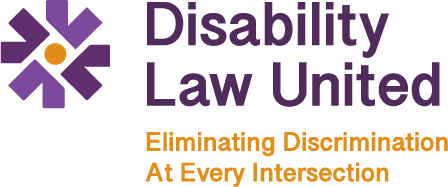Martie Lafferty, Director of Disability Law United’s Accessibility Project, was invited by the “Civil Rights Insider” to write an article about Disability Law United’s Fast Advocacy for Communication (FAC) program. The “Civil Rights Insider” is a publication of the Federal Bar Association’s civil rights law section. You can read Martie’s full article below or on page 8 of this PDF of the Fall 2020 edition of the Civil Rights Insider.
Disability Law United’s Fast Advocacy for Communication Program
By Martie Lafferty Director, Accessibility Project, Disability Law United
The Fast Advocacy for Communication (FAC) program addresses communication barriers impacting people with disabilities. Disability Law United https://disabilitylawunited.org/ provides FAC at no cost to clients.
Disability Law United is a nonprofit membership organization whose goal is to ensure that everyone can fully and independently participate in our nation’s civic life without discrimination based on race, gender, disability, religion, national origin, age, sexual orientation, or gender identity. Disability Law United’s Accessibility Project fights with urgency to make real the promises of the Americans with Disabilities Act (ADA) and similar disability rights laws. Our FAC program is a crucial part of our strategy to address disability discrimination and ensure equal access.
The ADA requires businesses and government entities to provide effective communication to people with disabilities.[1] This means that businesses and government offices are required to ensure that their communications with people with disabilities are “as effective as communications with others.”[2] In order to ensure effective communication, it is often necessary to provide sign language interpreters and other auxiliary aids and services.[3] Interpreters and other aid/services must be provided free of charge to people with disabilities.[4]
Disability Law United’s FAC program allows us to respond quickly and proactively when businesses or government offices refuse to provide Deaf, Deaf-Blind, Deaf-Disabled, or Hard of Hearing (DDBDDHH) people with sign language interpreters or other auxiliary aids and services necessary for effective communication. The highest demand for FAC is in regard to communication barriers in medical settings. However, we also use this approach to resolve denials of effective communication in other settings such as entertainment venues, adult educational settings, government programs, and attorneys’ offices.
The FAC process begins when a DDBDDHH person contacts us about the refusal of a business or government entity to provide effective communication for a future interaction such as an upcoming appointment or meeting. We are often able to complete intake the same day and, if FAC seems appropriate for the situation, to enter a retainer limited to FAC services. We then quickly send an educational letter to the business or government office explaining the ADA’s effective communication requirement and our client’s need for an auxiliary aid/service to ensure effective communication. The letter also provides links to resources for the requested aids/services. In most instances, the letter results in the entity agreeing to provide a sign language interpreter or other needed communication aid/service. When needed, we follow up with the provider to further discuss the situation. Over 80% of our FAC cases result in successful outcomes. For those that do not, we may offer additional services to our client including litigation when appropriate.
Disability Law United’s FAC program has resulted in successful outcomes including the following: 1. a rehabilitation center provided sign language interpreters for a 94-year-old Deaf man during his recovery from a stroke, 2. a birthing center provided sign language interpreters for a Deaf couple so that they could fully participate in the birth of their child, 3. a concert venue provided sign language interpreters so that a Deaf fan could enjoy one of her favorite performers, and 4. a county detention center provided sign language interpreters to a Deaf inmate for classes and installed a videophone so that he could equally participate in its phone program.
Currently most of our FAC work occurs in Colorado and Tennessee but we are working to expand this program nationwide. Please contact me at mlafferty@creeclaw.org if you are interested in more information about becoming a cooperating attorney for FAC in your state. Please also consider referring DDBDDHH people to Disability Law United for possible FAC or other assistance with barriers to effective communication. A downloadable FAC flyer is available online at https://disabilitylawunited.org/fac/ Potential clients can contact us at intakes@creeclaw.org or (VP) 518-249-6088.
[1] Title II of the ADA covers state and local government entities. 42 U.S.C. § 12131. Federal government entities and government entities that receive federal financial assistance are covered by Section 504 of the Rehabilitation Act (RA). 29 U.S.C. § 794. Because the requirements of ADA Title II and the RA are largely identical, we only discuss the ADA herein. Title III of the ADA covers places of public accommodation. 42 U.S.C. § 12181.
[2] 28 C.F.R. § 35.160(a)(1); see also 28 C.F.R. § 36.303(a), (c).
[3] 28 C.F.R. § 35.160(b)(1); 28 C.F.R. § 36.303(b).
[4] 28 C.F.R. § 35.130(f); 28 C.F.R. § 36.301(c).

